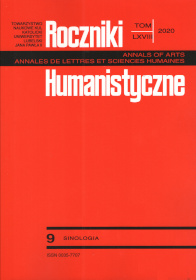Beyond East and West: What ‘Ladder’ Did John Wu Use Towards This Goal? (Part One)
Beyond East and West: What ‘Ladder’ Did John Wu Use Towards This Goal? (Part One)
Author(s): Zbigniew WesołowskiSubject(s): Law, Constitution, Jurisprudence, History of Law, Theology and Religion, History of Religion
Published by: Towarzystwo Naukowe KUL & Katolicki Uniwersytet Lubelski Jana Pawła II
Keywords: John Wu; Beyond East and West; spiritual autobiography; Christian faith, friendship; human and divine love; natural law
Summary/Abstract: John Wu Jingxiong (1899-1986) was a diplomat, scholar, and authority on international law. He was also a prominent Chinese Catholic convert. His spiritual autobiography Beyond East and West (1951) reminds us of the Confessiones of St. Augustine for its moving description of John Wu’s conversion to Catholicism in 1937 and his early years as a Catholic. The very title of Wu’s autobiography points to his spiritual ideal which let humanity go beyond cultural particularities (be they Western, Chinese or other). John Wu found wisdom in China’s great traditions, i.e. Confucianism, Daoism and Buddhism, pointing to their universal truths that come ultimately from, and are fulfilled in, Christ. The author of this contribution has searched for John Wu’s universal traits which go beyond any culture and which he called, metaphorically, a “ladder”. He has found a threefold ladder, i.e. that of Christian faith, that of human friendship and human and divine love, and that of natural law.
Journal: Roczniki Humanistyczne
- Issue Year: 68/2020
- Issue No: 9
- Page Range: 21-45
- Page Count: 25
- Language: English

